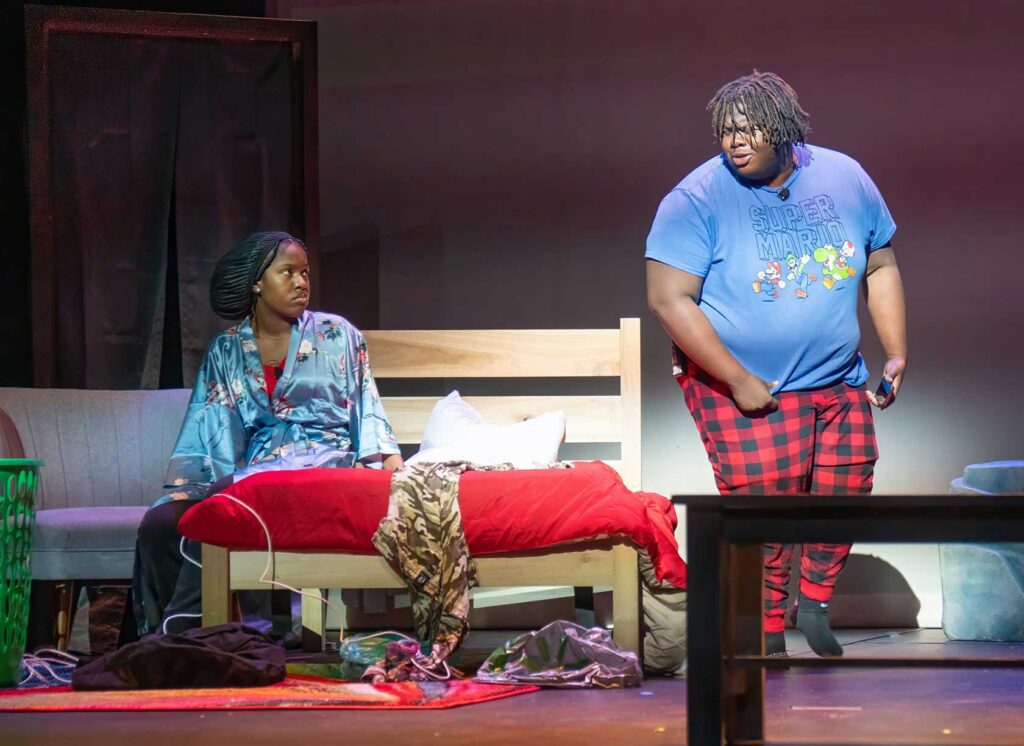
A dozen teenagers are gathered outside, different pairs and trios engrossed in separate activities. Some are shooting hoops while others jump rope. There are hand games and animated conversations, and, at one point, a flash mob-type dance break backed by an upbeat track. It’s a somewhat idyllic scene on a lovely day in a Boston neighborhood.
And then: gunshots.
The opening scene in “Senseless Smoke – Live,” a theatrical production based on a film of the same name, brings to life the fears and uncertainties of living in a culture of gangs and guns. As well as efforts to overcome the pathologies of that life.
The film and the play by the youth-led Teen Empowerment Center tell the story of a young boy named Trey who loses his older sister to gun violence and the ensuing grief he experiences. The spectators watch as Trey oscillates between choosing revenge or forgiveness, following his journey from anger and peer pressure to healing and community.
“Senseless Smoke – Live” began as a seed of an idea in 2019, when Teen Empowerment’s newly formed Youth Advisory Committee convened and strategized to put on a production at one of the organization’s annual Peace Conferences. The production, “Senseless Smoke,” would examine mental health and trauma in Boston’s youth.
When the pandemic hit, “Senseless Smoke” became a SoundCloud audio series and, later, a film. Starting in 2023, the team worked to adapt the film into its originally intended format as a staged production. The result was a show at the Emerson Paramount Center Friday and Saturday that included both the play and two intermissions for audience engagement.
“Not everyone has access to the performing arts … such as theater,” said Nathaniel McLean-Nichols, program director of Teen Empowerment Boston chapter. “One of the things that we’ve observed as residents of Roxbury, Dorchester, Mattapan is that there’s not very many performing arts theaters, and there’s not really much access to larger scale productions.”
Before working as the Boston programs director, McLean-Nichols was a youth organizer for Teen Empowerment beginning in 2016. In the last seven years, he said, the organization has “continued to open the door for me to be able to find myself in leadership roles,” one of his goals. He’s a music artist, and because one of Teen Empowerment’s focuses is the creative arts, being with the organization has expanded his industry network.
“Senseless Smoke – Live,” and other initiatives like it, are an opportunity to increase access to the performing arts. These platforms show “the young people in our community that things like this are possible when there’s time, resources and attention allocated to create productions that are on the scale of a Broadway production,” McLean-Nichols said.
Founded in 1992 by Stanley Pollack, Teen Empowerment’s mission is to “employ, train, and empower youth to, in collaboration with adults, create peace, equity, and justice,” according to its website. This means empowering youth to address the social justice issues affecting them, such as gun violence or education, said Abrigal Forrester, the organization’s CEO. Teen Empowerment achieves this by helping youth identify issues in their communities and equipping them with the skills necessary to tackle them.
The organization works primarily with young people of color but the demographics of the population it serves, Forrester said, reflect the communities in its locations in Boston, Somerville, and Rochester, New York.
The services Teen Empowerment offers to over 1,500 youth annually are “critical,” he said. Youth sometimes veer off “a positive life track because they are frustrated and feel like there are no options to address their frustration.” That frustration, he added, stems from facing the same issues repeatedly with seemingly no solution or end in sight.
Teen Empowerment “gives them a voice” and allows the teens to “maintain a level of stability from a mental health standpoint,” Forrester said. Instead of adopting unhealthy coping mechanisms to self-medicate, the teens learn that alternative options exist. The organization’s work is about bringing young people “to a place where they feel like they have some power or could have some impact on the things that they’re frustrated about in life.”
“Senseless Smoke” was a form of self-expression for the teens, some of whom may not have considered it an option, McLean-Nichols said. While the play was a staged production, it is real life for some of the youth, and Teen Empowerment has had a real impact.
Forrester gave an example of a teen who had lost someone close to him to murder. A friend brought him into Teen Empowerment for the interview process, which divides interested individuals into groups that decide who moves forward to the next level. When the boy first came in, Forrester recalled, he was standoffish and reserved. As time went on, he opened up and began sharing how he felt.
“He didn’t sit alone with those feelings,” Forrester said.
The denouement of “Senseless Smoke” begins with a touching scene between a gang-involved teen named Quan and his Uncle Jimmy, incarcerated for his own previous gang activity. Uncle Jimmy tells Quan that in his time in prison, he’s learned that violence is not the answer and that killing “our own” is counterproductive. When Uncle Jimmy is released, he leads a sort of crusade, uniting the opposing gangs and creating safer streets for the teens.






